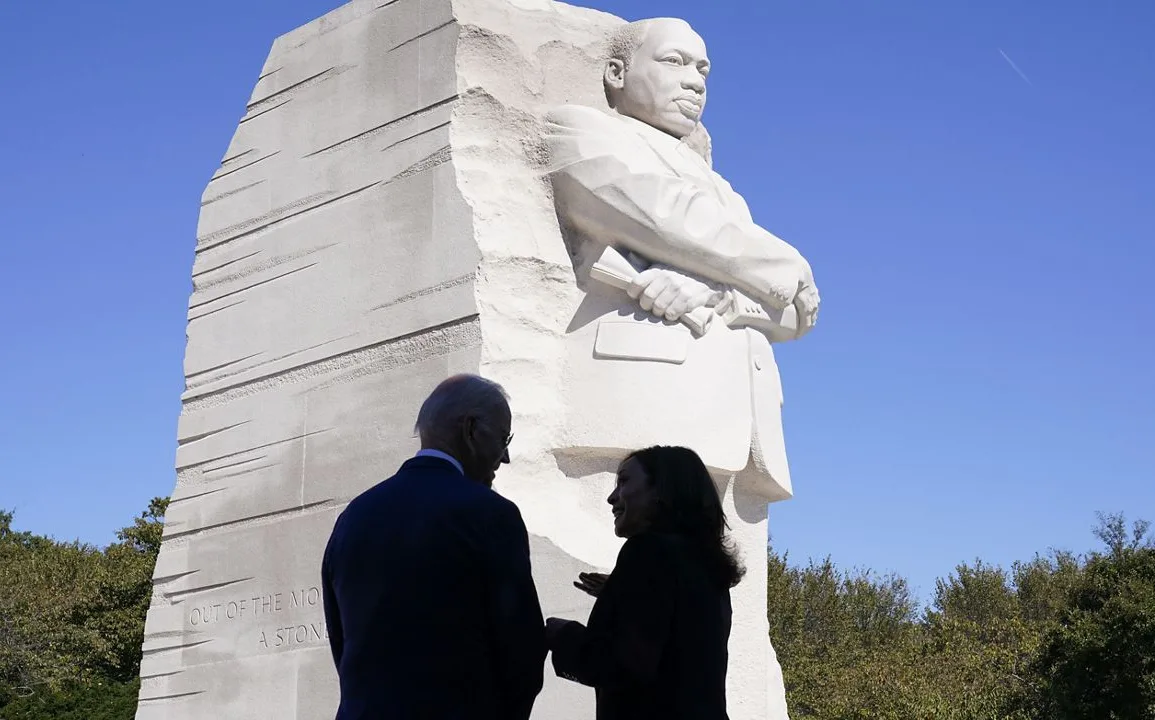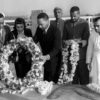Meeting with the Rev. Martin Luther King Jr.’s family to mark Monday’s 60th anniversary of the March on Washington, where King delivered his famous “I Have a Dream” speech at the Lincoln Memorial, President Joe Biden and Vice President Kamala Harris reflected on the legacy of King’s leadership within the context of the racist Jacksonville shooting that left three Black Floridians dead over the weekend.
Biden warned the rewriting of America’s racial history, book bannings, and a minority of Americans seeking to undo the progress made since King’s speech are all part of a growing movement in the U.S. that creates an environment for racist violence like the Jacksonville shooting.
“This is as serious a potential turning point for the negative as it was the turning point for the positive when your dad organized that march. I really think this is a critical time,” Biden said at the White House sit down with civil rights leaders. “We have groups, a significant minority, but I think they want to change the direction that we’ve been working on so hard and making such significant progress for so long. We can’t let it happen.”
The White House invited a broad group of civil rights leaders to the meeting, including Martin Luther King III, his wife, Andrea Waters King, his sister Bernice King and the Rev. Al Sharpton, along with representatives from organizations representing Jews, Hispanics and Asian Americans, according to Sharpton’s National Action Network.
The Democratic president was taking a page out of history by opening the Oval Office to King’s family. On Aug. 28, 1963, the day of the March on Washington for Jobs and Freedom, President John F. Kennedy welcomed King and other key organizers of the march to the Oval Office for a meeting.
Biden’s meeting comes two days after Saturday’s racist attack at a Jacksonville, Florida store in which three Black people were shot to death by a white man wearing a mask and firing a weapon emblazoned with a swastika. The shooter, who had also posted racist writings, killed himself.
At the meeting, Biden said he spoke with Florida Gov. Ron DeSantis, Jacksonville’s mayor and sheriff, and Black community leaders in the area. He also noted that the families of two of the victims had agreed to speak with him, while a third declined.
“We can’t let hate prevail and it’s on the rise. It’s not diminishing,” Biden said. “Silence is complicity. We’re not going to be silent. And so we have to act against this hateful violence.”
“We have to speak out that there’s a whole group of extreme people trying to erase history,” Biden continued. “I never thought that I’d be president, let alone be president and having a discussion on why books are being banned in American schools.”
DeSantis, who is also running for the Republican presidential nomination to take on Biden next fall, pushed for and signed legislation in his state that made it easier for Floridians to petition schools to remove books. Hundreds of books have been banned, typically focused on issues of race and gender, according to the century-old freedom of expression advocacy organization PEN America. Books removed include biographies of baseball players Hank Aaron and Roberto Clemente, “The Handmaid’s Tale” by Margaret Atwood, “Forever” by Judy Blume,” and “The Bluest Eye” by Toni Morrison, which won a Nobel Prize for Literature.
DeSantis, who Biden did not mention by name, has also banned an Advanced Placement African American studies course for high schoolers, launched a crusade against teachings about systemic racism at public schools and universities, and largely forbidden instruction on sexual oritentation and gender identity for kids K-12.
And one month and one day before a gunman armed with a swastika-adorned assault rifle killed three Black people in Florida’s largest city, DeSantis had to fire a staffer who incorporated a Nazi symbol into a campaign ad.
At a vigil in Jacksonville on Sunday, DeSantis was loudly booed by mourners.
“What he did is totally unacceptable in the state of Florida,” DeSantis said at the vigil on Sunday. “We are not going to let people be targeted based on their race.”
Another Republican presidential candidate, entrepreneur Vivek Ramaswamy, defended his denial that white supremacy exists in American politics on Sunday after arguing the modern equivalent of the Ku Klux Klan was a Black congresswoman and a Black popular writer who used America’s history of racism to inform their politics. Ramaswamy is currently in third place in national polling after DeSantis and former President Donald Trump, according to polling aggregator FiveThirtyEight.
Biden was also set to address a reception Monday evening to mark the 60th anniversary of the Lawyers’ Committee for Civil Rights Under Law, a nonpartisan, nonprofit legal organization that was established at Kennedy’s request to help advocate for racial justice.
In an opinion piece written for the Washington Post earlier on Monday, Biden said the administration is working to advance King’s dream of a society in which people don’t judge others by their skin color.
Biden said his policies have led to a drop in Black unemployment, more small businesses being opened by Black entrepreneurs and more Black families covered by health insurance.
He’s given some $7 billion to the network of historically Black colleges and universities and has emphasized appointing Black people to his Cabinet and White House staff, throughout the federal judiciary and to independent agencies like the Federal Reserve.
“For generations, Black Americans haven’t always been fully included in our democracy or our economy, but by pure courage and heart, they have never given up pursuing the American Dream,” Biden wrote.
He also referenced Saturday’s shooting.
“We must refuse to live in a country where Black families going to the store or Black students going to school live in fear of being gunned down because of the color of their skin,” Biden wrote.
He called on the country to “reject the cramped view that America is a zero-sum game that holds that for one to succeed, another must fail,” adding: “Let us remember America is big enough for everyone to do well and reach their God-given potential.”
Biden’s meeting with King’s family and his remarks at the reception will give the president, who is running for reelection, an opportunity to appeal to Black voters by talking about what he and the broader administration have done to help make their lives better.
But Biden has also struggled to fulfill key promises to Black voters, perhaps the most loyal group in his political base. He kept a promise to put a Black woman — the first to serve — on the Supreme Court, but has been unable to follow through on pledges to shore up voting rights or enact changes to policing to help stop violence against people of color by law enforcement. Legislation on both issues has stalled in a divided Congress.
Harris, the first Black person elected vice president, said in a statement Monday that the march, though historic, “was neither the beginning nor the end of the movement for civil rights.”
“Today, sixty years after that historic day, let us rededicate ourselves to the fight for equity, opportunity, and justice,” she said. “And let us continue to work to secure our most foundational freedoms: the freedom to vote, the freedom of women to make decisions about their own bodies, and the freedom to live free from hate and violence.”
The 1963 March on Washington is still considered one of the greatest and most consequential racial justice demonstrations in U.S. history.
The nonviolent protest attracted as many as 250,000 people to the Lincoln Memorial and provided momentum for Congress to pass landmark civil rights and voting rights legislation in the following years. King was assassinated in April 1968 in Memphis, Tennessee.
On Saturday, the same day as the shooting in Florida, thousands converged on the National Mall for a 60th anniversary commemoration. Speakers and others said a country still riven by racial inequality has yet to fulfill King’s dream of a colorblind society in which his four children “will not be judged by the color of their skin but by the content of their character.”



